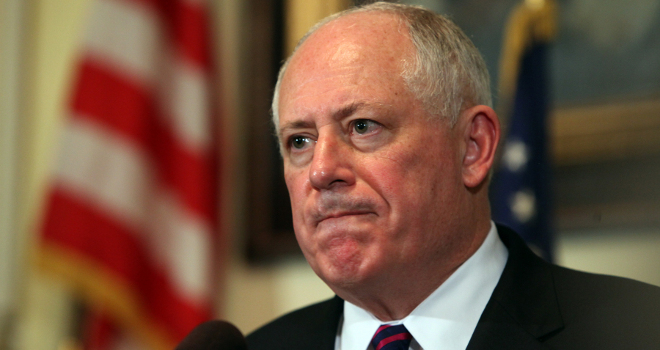Anyone who wants to protest a military funeral in Illinois will have to do so from a distance of 300 feet, according to a new measure Gov. Pat Quinn (D) signed on Sunday.
The legislation is an expansion of the “Let Them Rest in Peace Act,” one of Quinn’s “top initiatives”, press secretary Annie Thompson told TPM. The extension expands on the law’s previous 200-foot barrier.
“Every family has a fundamental right to conduct a funeral with reverence and dignity,” Quinn said in a statement. “This law ensures that the families of those who have given their lives for our country can grieve without harassment. It is our duty to honor their sacrifice by ensuring they are remembered with the respect and solemnity.”
As the Chicago Tribune points out, the legislation doesn’t directly name the Westboro Baptist Church, the controversial group famous for their boisterous protests of military funerals. According a Westboro Baptist lawyer, the church won’t be deterred.
“They can make (the ban distance) 100 miles, and it changes exactly nothing,” Margie Phelps told the Chicago Sun-Times. “You all are delusional if you think you’re going to win this one.”
Fred Phelps Jr. — a member of the church and the church leader’s son — told TPM the group will challenge the Illinois law in court “sooner rather than later.”
Phelps Jr. said the Westboro Baptist Church has been to Illinois about 15 or 20 times, and protesters usually are up to a mile away from funerals. So why the concern over the new 300-foot distance?
It comes down to “principle,” Phelps Jr. said. If anything, he said, the church will protest in Illinois more often now “just because of the attention.”
“This is just a political ploy to get votes,” he added. “Nothing new.”
Back in March, the Supreme Court ruled that the Westboro Baptist Church has the right to protest at military funerals. But Thompson said the court’s decision doesn’t really affect this act. “This is really just an attempt to expand what we already had in law here,” she said.
“It’s important to make sure that military families, when burying their loved ones who have given the ultimate sacrifice, are able to do so in a manner that’s respectful,” Thompson added.






